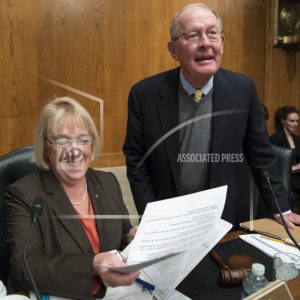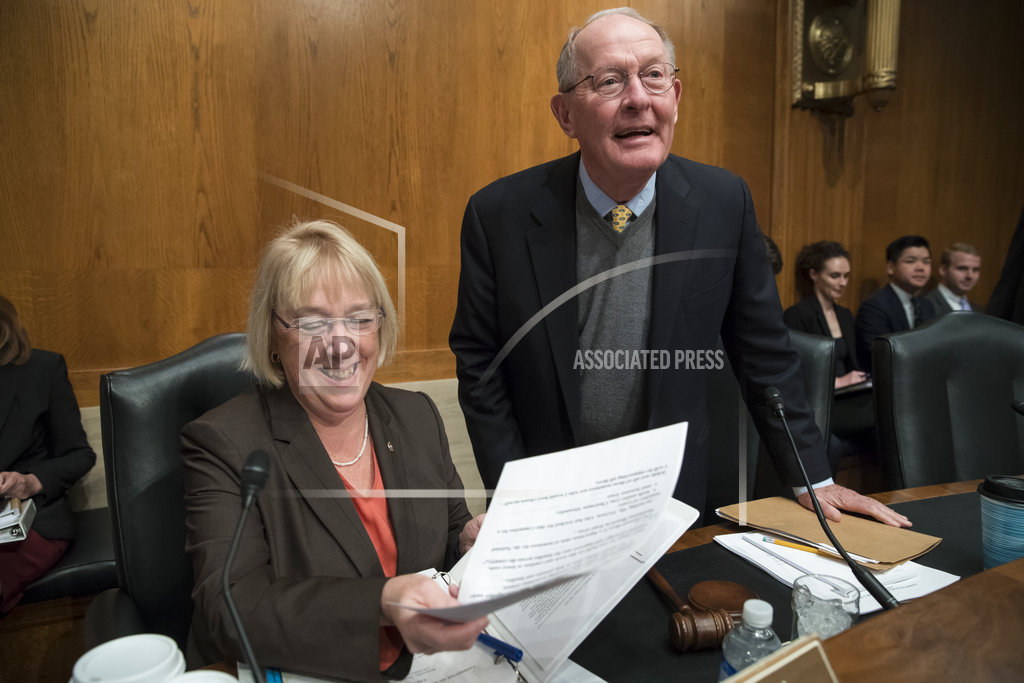
WASHINGTON (AP) — President Donald Trump sent more perplexing signals Wednesday about whether he backs a bipartisan Senate deal for steadying health insurance markets, saying he backs lawmakers’ efforts to strike that compromise but “can never support” federal bailouts for insurers.
A chief sponsor of the agreement, Sen. Lamar Alexander, R-Tenn., said Trump called him Wednesday morning and encouraged him to continue his effort, but left himself wiggle room. Alexander and Sen. Patty Murray, D-Wash., reached their accord a day earlier for a two-year continuation of federal subsidies to insurers that Trump has halted, coupled with an easing of some coverage requirements under President Barack Obama’s health care law.
“I’m going to review it,” Alexander said in a brief interview with The Associated Press, describing what Trump said about the deal. “I may want to add something to it. And it may have to be part of a larger negotiation.”
Asked if Trump backs his agreement with Murray, Alexander said, “You’ll have to ask him.” Yet the senator also predicted that “some form of the proposal” would become law by year’s end.
Trump tweeted Wednesday morning, “I am supportive of Lamar as a person & also of the process, but I can never support bailing out ins co’s who have made a fortune w/ O’Care.”
Trump’s erratic signals have added uncertainty to the proposal’s fate.
The accord has been hailed by Democrats and some Republicans who say the payments must be continued to avoid roiling health insurance marketplaces. Top congressional Republicans have given the plan a frosty reception and many conservatives oppose it, saying it would prop up Obama’s Affordable Care Act, a law they’ve long vowed to repeal.
Under Obama’s statute, insurers are required to reduce costs like co-payments and deductibles to lower-income customers. The program helped more than 6 million people this year at a cost of $7 billion.
The insurance industry and outside analysts have said halting the federal subsidies would force insurers — who still must provide the cost reductions to consumers — to boost premiums and leave some unprofitable markets. Trump halted the payments last week.
The nonpartisan Congressional Budget Office has estimated that ending the subsidies would push premiums up by an average 20 percent next year. This would especially hit people buying their own health insurance who earn too much to qualify for tax credits that reduce premiums for millions of others who do qualify for the aid.
Trump’s quickly shifting stances angered Senate Minority Leader Chuck Schumer of New York, who took to the Senate floor Wednesday morning to accuse Trump of backing down on this issue and others whenever the hard right objects.
“This president keeps zigging and zagging so it’s impossible to govern,” Schumer said. “Our only hope is that maybe tomorrow he’ll be for this again.”
Doug Andres, spokesman for House Speaker Paul Ryan, said Wednesday, “The speaker does not see anything that changes his view that the Senate should keep its focus on repeal and replace of Obamacare.”
Senate Majority Leader Mitch McConnell, R-Ky., was noncommittal about the agreement, saying, “We haven’t had a chance to think about the way forward yet.”
Both McConnell and Ryan have been eager to turn national attention away from the GOP push to scuttle Obama’s law, which crashed in the Senate twice, and toward an effort to cut taxes.
In remarks Tuesday in the Rose Garden, Trump called the deal “a very good solution” that would calm insurance markets, giving him time to pursue his goal of scrapping the Affordable Care Act.
But in an evening speech at the conservative Heritage Foundation, he said that “while I commend” the work by the two senators, “I continue to believe Congress must find a solution to the Obamacare mess instead of providing bailouts to insurance companies.”
Rep. Mark Walker of North Carolina, chairman of the conservative Republican Study Committee in the House, tweeted: “The GOP should focus on repealing & replacing Obamacare, not trying to save it. This bailout is unacceptable.”
Freedom Caucus Chairman Rep. Mark Meadows, who’s been at work on a proposal of his own, was slightly more positive, calling the Alexander-Murray bill “a good start” but saying much more work needed to be done.
The deal includes provisions allowing states faster and easier access to waivers that would allow them to shape their own marketplace plans under the health law.
It would provide for a new low-cost catastrophic coverage insurance option for all consumers. It would also restore $106 million for outreach and enrollment programs aimed at prodding people to buy policies — efforts that Trump has slashed.
A federal judge ruled in a 2014 lawsuit brought by House Republicans that Congress never legally authorized spending money for the insurers’ subsidies. Obama and Trump, initially, continued making the payments, though Trump declared last week he would pull the plug.



